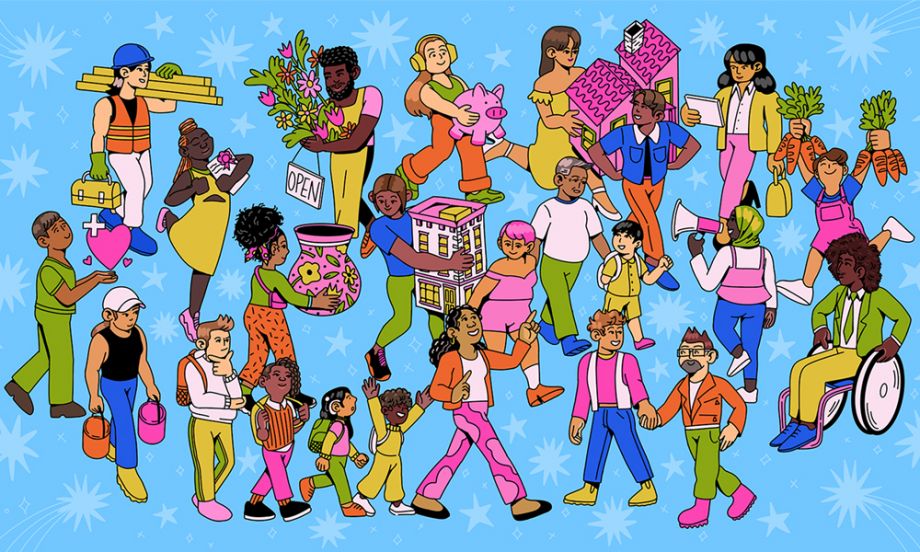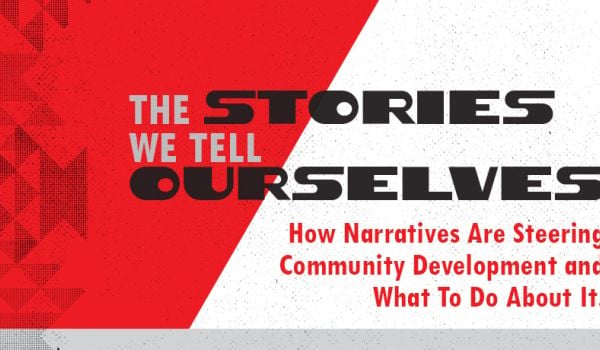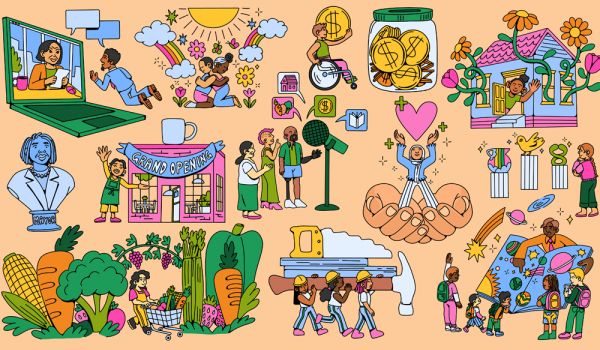As a coalition organizer with a health and healing justice lens, privileged to work with and learn from amazing community leaders of the Twin Cities at the intersection of housing, small business, climate, workforce, tenant rights, transit corridors, and narrative shifting, anti-racist community development embraces all of what I do.
Note that I did not pluralize intersection. Anti-racist community development is not a solo, uni-linear act. It cannot be achieved in one effort, by one sector or at a single moment in time. It’s an ensemble across disciplines. As the Anti-Racist Community Development research named, the anti-racist approach will require new frameworks, such as ones that lift up and resource “cross-sector and holistic strategies that integrate arts + culture, environmental justice, and public health.”
I start with envisioning what anti-racist community development looks like. It’s overcoming the disproportionate investments in streets and streetlighting of one neighborhood to another. It’s investments sparked by publicly funded transit lines that connect jobs and affordable housing to poverty-ending careers. It’s placemaking developments that build upon the vibrant communities and cultures who have made a place home for generations. It’s where the rules of how we engage each other are co-created and not just kept by one person until the rules are violated. It is land back to Indigenous communities. And it is reparations as defined by the communities historically and perpetually harmed.
I then imagine what that feels like. As communities of color, we endure innumerable microaggressions throughout our days, in addition to too often outstanding aggressions, that cause our jaws to clench, chests to tighten, and vision to narrow to only what’s in front of us. Anti-racist community development can be found in small random acts of kindness such as vacant lot cleanups and alley beautification, which then unconsciously penetrate our spirits in messages of respect and love. Ultimately, Anti-Racist Community Development as a feeling settles our nervous system and lets us rest into everything the term “home” embodies.
At The Alliance, we promote Anti-racist community development through affirming principles, criteria, and practices of equitable development responding to the question: “How can development repair past harms and contribute to a stronger, more inclusive and thriving community?”
In 2016, the Twin Cities community of Minnesota released the Equitable Development Principles and Scorecard (Scorecard) to proactively define equitable development in community terms, and thus creating a framework for developers, planners, and communities across the United States that can be adapted to local visions.
The Scorecard desilos investments in our communities and forces a comprehensive perspective of development to acknowledge a development is only as equitable as it promotes not only one area of development, but how it impacts equity principles of the following six areas:
-
Community Power
-
Economic Development
-
Land Use/Environment
-
Housing
-
Transportation
-
Livability
As communities across the country picked up the Scorecard, which initially only had the first five principle areas, it was clear a less measurable but implicitly essential element was missing – livability, which can only be achieved by acknowledging community history and centering community power and community healing. Therefore, “Livability” was added as a sixth principle in 2021.
The Equitable Development Principles and Scorecard is more than a Scorecard. It is a tool for communication, co-creation, shared vision, shared language, and grounding. It is an organizing tool that requires the input of community and lays out community vision into concrete measurable actions community development projects, policies, investments, and practices can set forth to meet.
Anti-racist community development is found at the intersection of these six principles in cross-sector, holistic strategies. And the vision and work goes beyond a beautiful development; it is the intentionality applied to the interactions the development will have with our communities into the future so that we may realize the experiences and feelings I and others seek to be at home.
The author is responding to the findings shared in the Anti-Racist Community Development Research Project, produced with support from the Robert Wood Johnson Foundation (RWJF) to increase understanding of structural racism in community development and pathways to racially equitable outcomes that promote health equity. The views expressed in this article do not necessarily reflect the views of RWJF or ThirdSpace Action Lab.
© 2023 Robert Wood Johnson Foundation
Joo Hee Pomplun serves as Executive Director of the Alliance for Metropolitan Stability, a multi-organization coalition building power across the intersections of geography, race, culture, and issues in the Twin Cities region of Minnesota to eliminate systems of oppression and advance our collective liberation. They have been impacting community development through organizing for over 25 years, and currently lead the Equitable Development Principles & Scorecard learning table at The Alliance.



_600_350_80_s_c1.jpeg)







